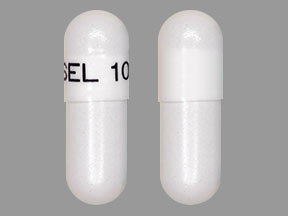Selumetinib and Alcohol/Food Interactions
There is 1 alcohol/food/lifestyle interaction with selumetinib.
Selumetinib Food/Lifestyle
Major Food Interaction
Grapefruit juice can increase the blood levels of selumetinib. This may increase the risk and/or severity of serious side effects such as diarrhea; colitis (inflammation of the colon); skin rashes; cardiomyopathy (a condition that affects the heart muscle and its ability to pump blood); rhabdomyolysis (a rare condition involving the breakdown of skeletal muscle tissue that can cause kidney damage and death); and eye problems that can lead to blindness. Do not consume grapefruit, grapefruit juice, or any supplements that contain grapefruit extract during treatment with selumetinib. Talk to your doctor or pharmacist if you have any questions or concerns. You should seek prompt medical attention if you experience severe diarrhea; severe skin reactions (rash over a large area of the body, peeling skin, blisters); signs and symptoms of heart trouble (persistent coughing or wheezing, shortness of breath, swelling of ankles and feet, fatigue, increased heart rate); muscle problems (unexplained muscle pain, tenderness or weakness, especially with fever and/or dark colored urine); or vision problems (blurred vision, light sensitivity, dark spots or floaters, vision loss). It is important to tell your doctor about all other medications you use, including vitamins and herbs. Do not stop using any medications without first talking to your doctor.
Switch to professional interaction data
Selumetinib drug interactions
There are 263 drug interactions with selumetinib.
Selumetinib disease interactions
There are 2 disease interactions with selumetinib which include:
More about selumetinib
- selumetinib consumer information
- Check interactions
- Compare alternatives
- Reviews (2)
- Side effects
- Dosage information
- During pregnancy
- Drug class: multikinase inhibitors
- Breastfeeding
- En español
Related treatment guides
Drug Interaction Classification
| Highly clinically significant. Avoid combinations; the risk of the interaction outweighs the benefit. | |
| Moderately clinically significant. Usually avoid combinations; use it only under special circumstances. | |
| Minimally clinically significant. Minimize risk; assess risk and consider an alternative drug, take steps to circumvent the interaction risk and/or institute a monitoring plan. | |
| No interaction information available. |
See also:
Further information
Always consult your healthcare provider to ensure the information displayed on this page applies to your personal circumstances.


